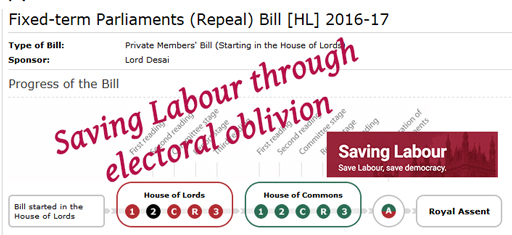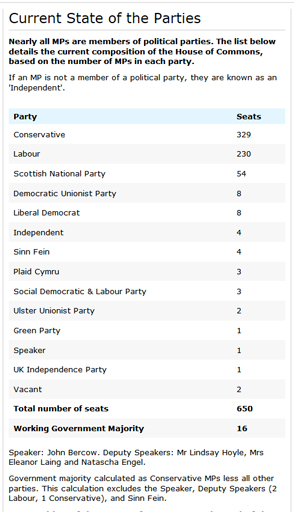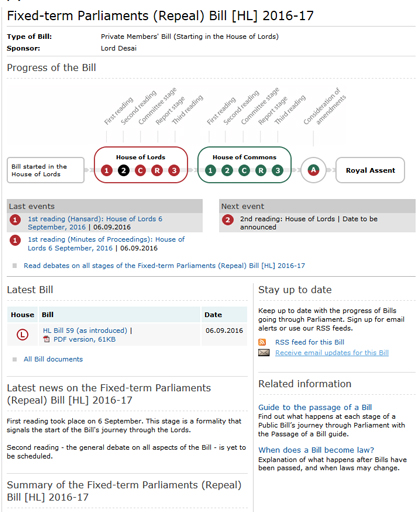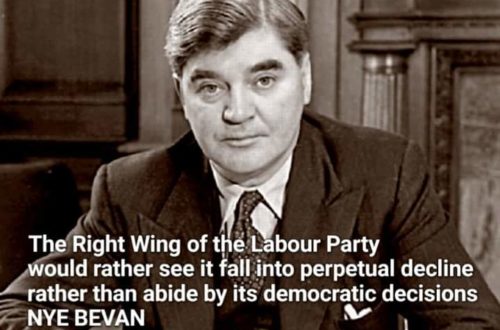
Progress is Saving Labour by Colluding with the Tories

The latest instalment of the ongoing saga that sees the right wing of the Labour Party going all out to make the party unelectable under the current leader. Since changing the Party rules didn’t get rid of him, they’re now conspiring with the Tories to wipe the party out electorally.
For over 12 months now, the right wing of the Labour Party via its Progress and Saving Labour factions has been determined to destroy the credibility and electability of the Party in pursuit of maintaining its hold on the Party and so ensuring the Party maintains its neoliberal ideology.
From the constant briefing against the (now twice) elected leader, to changing the party rules to exclude members who may have supported the leader in the recent leadership elections, they’ve been less than subtle in their attempts to wrest control back from the members. The polls reflect the opinion of a voting public that has understandably been repelled by the machinations.
In itself, this damaging of the Party’s public standing in pursuit of regaining control over the Party should be considered quite a serious issue, yet because it’s being undertaken by those who currently hold the power, it’s being allowed to continue unchecked.
The latest plot by the Progress faction to remove the leader appears to be the most deadly yet. They’re aiming to repeal the Fixed Term Parliament Act to give the Tories the ability to call an election when Labour is at its weakest.
Under the Fixed Term Parliament Act, the elected government must serve the full term unless one of two things happen:
- either 434 of the 650 MPs agree to call an election or,
- there’s a vote of no confidence or a failed vote of no confidence but without a confidence vote being passed within 2 weeks of that failed one.
Lets look at the numbers. There are currently 650 seats with 2 vacant. There are 329 Conservative MPs and 230 Labour MPs. Even if every MP, barring Labour MPs, voted for an early election, the Government would only have 420 votes, which is 14 short of the minimum required to trigger the election.
The vote of no confidence would be slightly different as that would need a simple majority of those who voted that day but the government would ensure that all government MPs were in the chamber or paired with an opposition MP to make sure they didn’t lose. That’s not going to happen.
So, how can an early election be triggered? Only with the complicity of Labour MPs. As we know, from the Telegraph report on 20 August 2016, Tory MP Andrew Bridgen has claimed he has been approached by 3 Labour MPs:
Mr Bridgen said he has been approached by three Labour MPs in Westminster who have asked for him to continue his bid for a nationwide vote in order to oust Mr Corbyn.
So if the Conservatives see electoral advantage in an early election, they would only need 14 Labour MPs to support the bill and an election would be triggered. A small number when you consider the number of Labour MPs who are very publicly against the current Labour Party leader. The problem for the Government is that once the bill is passed the election must be called, so the government has less control than it would like over when to go to the polls.
After the surprise (to the Westminster bubble anyway) result of the referendum, where David Cameron agreed to the referendum to satisfy his backbenchers in the belief the referendum would confirm the status quo, the conservatives may not want to risk an adverse result again without more confidence in the outcome. To do that, they’d need full control over when an election is called.
It now appears that certain elements in the Labour Party are supporting the Government in this. The Labour Peer, Lord Desai has introduced into the House of Lords a bill to repeal the Fixed Term Parliament Act. If this is successful (and there’s no reason to suppose it won’t be) it will enable the Government to call an election whenever it wishes.
The advantage to the Government of the repeal of this bill is immense, as it gives them the full control they need over the timing of the next election.
I’ve yet to see any argument for this bill that says it’s in the interests of the Party and cannot see any benefits to Labour in repealing this bill.
Currently, Labour knows it has until 2020 to woo voters and make sure its policies are robust and understood by the electorate. It may be winning at the local election level but the mud slung down the last 3 months in particular will have repelled the casual voter. So why would a Labour peer introduce something that isn’t in Labour’s best interests? The short answer is that it’s not in their interests. With the repeal of this Act, the Tories could call an election any time it sees an advantage.
So why would Labour do this?
With the Labour Party currently divided and in such disarray, it would be electoral suicide for Labour to be forced to go to the people now. As Andrew Bridgen goes on to say in the Telegraph article, this is the plan.
The MP claims that the Labour members warned the only way to rid the party of Mr Corbyn would be for Labour to be “wiped out” at a general election and prove his unpopularity with the public.
After an electoral defeat, the leader would be expected to resign of course and with the current position of the 172 “rebels”, it would be unlikely that any left wing candidate would get the nomination numbers to stand. The left wing would effectively be consigned to irrelevancy within the party, with the history of the right wing machinations that brought about the defeat glossed over and soon forgotten.
So there you have it. The Progress faction appear to be determined to ensure that the party is in the worst possible position for the next 4 years by ensuring that the party no longer has a guaranteed time-frame to prepare for the election. Saving Labour now appears to mean handing electoral victory to the Tories. The right wing of the party will continue destabilising and colluding with the media in an attempt to justify its behaviour and eventually we’ll have an early election that has a good chance of seeing Labour wiped out as an electoral force. Yet no one is saying a word, nor trying to stop them.
The silence is deafening.





